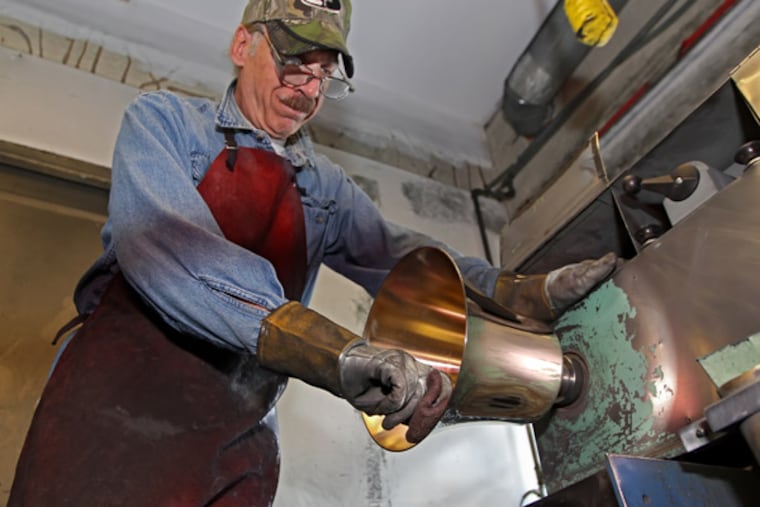Sellersville bell maker considers moving out
For more than 60 years, bells ringing at college campuses, churches, cemeteries, and world's fairs have been crafted in a Bucks County borough of 4,200 people.

For more than 60 years, bells ringing at college campuses, churches, cemeteries, and world's fairs have been crafted in a Bucks County borough of 4,200 people.
The artisans of Schulmerich Carillons create handbells, steeple-top bells, and electronic systems to ring out the sounds of music and convey the time of day.
But Sellersville may soon lose its well-known manufacturer. The company, which employs 40 people, has an agreement to sell its seven-acre property and is looking for a new place to produce the bells that have made Schulmerich a big name in a small industry.
"We need a building more suitable for modern-day manufacturing," company owner Jonathan Goldstein said of the maze of seven single-story buildings that once served as a shirt factory. "This is how things were done in the '50s and '60s, not today."
Goldstein, 41, of Narberth, said he was seeking a "fresh start" for the business and its employees, much like the one he embarked on when he purchased the business last year.
The former president and founder of a software-development company, who twice unsuccessfully ran against former State Rep. Babette Josephs of Philadelphia, said he wanted to take a partial step out of the rat race to reinvigorate a company content to "just turn out beautiful sounds."
But if the business leaves Sellersville, it will take it with part of the definition of the 275-year-old town.
"The Schulmerich Carillons bell plant has been a fixture here," said David Rivet, borough manager. "It has provided jobs and a bit of identity. We would love to keep it here."
Goldstein, a lawyer, says he is considering all options, including a large parcel in Sellersville as well as other parts of Bucks County and neighboring counties. Philadelphia and locations outside Pennsylvania are also in the running.
The company has an agreement to sell its land to W.B. Homes Inc., based in North Wales, which plans to construct a 54-unit development of twin and townhouses called Carillon Hill. The agreement was contingent on approval of a request by W.B. Homes to rezone the property from industrial to residential. The Borough Council voted to rezone the property July 8, Rivet said.
W.B. Homes hopes to start construction next summer, said Chris Canavan, a senior vice president.
The company was founded in 1935 in Philadelphia by George Schulmerich, whose early customers included John Wanamaker and Father Flanagan's Boys Town. It later moved to Bucks County.
The firm makes handbells, MelodyChime instruments (handheld chimes), cast bells and towers, and the electronic carillon, a computerized system created by George Schulmerich.
"There is an emotional connection to the sound of a bell, whether it's used in liturgy or to suggest faith or remembrance," said Kermit Junkert, a vice president, who has worked at the company for 26 years.
Schulmerich sold the company, and it landed in a family trust. Over the years, revenue declined.
Goldstein, whose grandfather owned an industrial-fixtures manufacturing firm, has installed new equipment and software, and introduced products including a digital carillon that can mix and match a record number of genres and instrument sounds.
The bell business is in a challenging time. Main Line Protestant churches are downsizing, as are many Catholic dioceses. Schulmerich is looking to expand its customer base and explore new markets, including overseas.
The move is part of ensuring the firm's future, Goldstein said. But employees are hoping the company stays in the area.
"It would be nice to have a more updated building," said Barbara Sprouls, 52, who has worked at Schulmerich for 28 years with her husband, Norm, 56, a shop steward.
"Hopefully it won't [move] too far," said Sprouls, of Harleysville.
Her husband also was hopeful.
"Change is sometimes good," Norm Sprouls said. "It's just the adjusting that's hard."